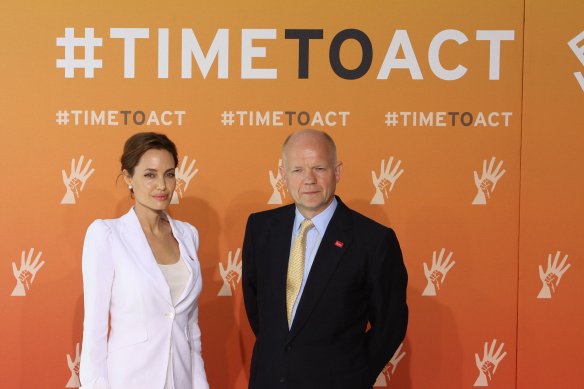
Angelina Jolie and Foreign Secretary William Hague at the Global Summit to End Sexual Violence in Conflict. CC BY 2.0 Foreign and Commonwealth Office
A Global Summit to End Sexual Violence in Conflict is taking place in London on 10-13 June. World leaders are meeting to discuss ways of combating the use of sexual violence in conflict and of improving efforts to bring perpetrators to justice. This is a historic event. Never before have so many powerful people with decision-making authority been gathered to discuss this topic. Let us hope that this initiative brings results for those affected.
Sexual violence in conflict is no longer seen as an unintended consequence of warfare, but is increasingly understood as a tactic of war. No longer private and hidden, this type of violence has become a security concern. This is reflected in the fact that the UN Security Council has passed resolutions on combating sexual violence and that NATO is working to combat such violence by military means. In addition various means of prosecuting the perpetrators are being pursued both nationally and supranationally. In other words, there has been a complete change as a result of a growing recognition that men and women often have different roles in – and accordingly difference experiences of – times of war. Historically, women have not played an equal role with men politically, and have also not been of equal interest to researchers. As a result their experiences, insights and ideas have been excluded and overlooked. This situation is now changing, but according to the British the change is happening too slowly.
The UK had the presidency of the G8 Group in 2013 and wished to use the opportunity to promote foreign policy issues that it thought were in particular need of attention. Well assisted by Angelina Jolie (special envoy for the UNHCR, the UN’s refugee programme), the UK’s foreign secretary William Hague highlighted the need to combat sexual violence and to make the prosecution of perpetrators more effective. Hague and Jolie are impatient and think that the progress of these efforts is inadequate. There are too many compromises and disputes when one has to reach agreement in supranational fora. This is why Hague and Jolie have initiated and are hosting this global summit in London this month. The meeting will discuss how to prevent perpetrators from going into hiding; how military and political leaders can be made liable for attacks perpetrated by their soldiers; and how to improve help for the victims.
At a recent meeting at the Norwegian Ministry of Foreign Affairs concerning the Norwegian government’s new strategy for its work with ‘women, peace and security’, Norway’s minister of foreign affairs, Børge Brende, said that it is important for more countries to take initiatives such as that now being taken by the UK. Norway’s role this time round is to support the British initiative, something that Mr. Brende is demonstrating by, among other things, travelling to London to deliver a speech and lead one of the debates.
But the Norwegian government could do so much more. One of the essential reasons why sexual violence functions so effectively as a weapon in conflict is social inequality between men and women. Rape, particularly in conflict, is a cheap and effective means of oppressing people who are already at a disadvantage, militarily, economically, socially, and culturally. The victims are usually women. Accordingly a campaign to promote social equality is also an effective way to combat sexual violence, because equality between the genders would invalidate the logic behind such violence. Perhaps this is the message and challenge that should be presented by the minister of foreign affairs of one of the world’s most gender-equal countries? Regardless of whether Mr. Brende wishes to take up this idea or not, it is uplifting that so many male foreign ministers are now committing themselves to combating sexual violence. For such violence is not only a women’s problem. It is a problem primarily because far too many men become transformed into attackers in a conflict situation. In order to address this we need male commitment – politically, socially and militarily.
The British initiative to hold a global summit is historic for several reasons: the number of participants is enormous; the status of the politicians attending is high; top male politicians are taking ownership of a subject that has often been seen as a ‘women’s issue’; and the political rewards of success will be considerable. If the British get credited for increased efforts to combat sexual violence, this will represent important foreign policy capital for the UK. Could Norwegian foreign policymakers perhaps allow themselves to be inspired to arrange an equivalent global summit on women’s political participation in peace processes? Here Norway has an advantage in the form of its international recognition for commitment to gender equality as well as to peace. If the British can help end sexual violence, perhaps Norway can help bring women to the negotiating table in conflict zones around the world. In that way Norway could complement the British initiative and show its own commitment in an area that is of great significance for international peace and security.
This text is also published in Norwegian, as an Op Ed at Ytring.no 11 June 2014